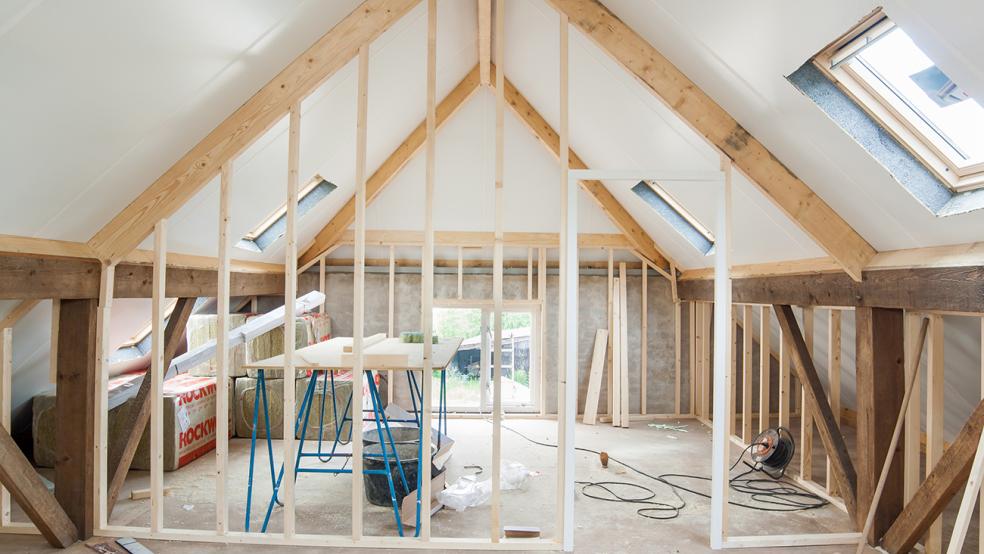As home prices continue to rise, more people are looking for ways to make their current home meet their needs — and feeling more comfortable investing money to make that happen.
That’s good news for the broader economy, but it means that it’s getting tougher to get a deal from a home contractor. “They’re all working beyond capacity right now,” says Brad Hunter, chief economist at HomeAdvisor. “There’s no slack. That makes it harder to find something super cheap, but if you do your research, you can still get a good deal.”
Related: The Cost of Living: How Far Does $100 Go in Your State?
The 2017 Cost vs. Value Report from Remodeling magazine found that renovation costs were up across the board, with the average project costing 3 percent more than last year. General contractors are so busy that they’ve got a backlog of seven weeks nationwide, with builders in California reporting a backlog of more than three months, according to Houzz.
Competition for good contractors is fierce, and ending up with a bad one could mean a terrible experience or, worse, work that ends up subpar or unfinished. Follow these steps to make sure that you’re not getting ripped off on your home improvement project.
1. Start with a realistic budget. Sites like HomeAdvisor and Remodeling magazine offer easily searchable data to give you sense of what a project should cost. Expect to pay more if you live in pricey areas or want to use high-end materials. Keep in mind that if you’re selling the home soon, you won’t get a dollar-for-dollar return on your investment, no matter how nice the finished project.
Related: Making a Big Money Move? Why You Should Consult a Financial Adviser
Make sure you’ve got enough cash or have secured financing to cover that budget, plus another 10 percent to 20 percent for cost overruns that inevitably pop up. The older your home, the more likely you’ll run into unforeseen expenses.
2. Shop around. Ask friends for references and check reviews on Angie’s List or Yelp. One negative review is probably not worth worrying about, but several of them could indicate a problem. Look for contractors who’ve been in business for a few years and who specialize in the type of project that you’re planning.
Interview at least three contractors, and ask them for references and photos of their work as well as proof that they’re licensed and insured. Ask them to be specific about their plans for the project (some will even provide computer renderings), including what materials they’ll use, how they’ll handle change orders or cost overruns, and when they realistically expect to start and finish the project.
Related: Big Profits Are Back for Home Sellers
Getting multiple bids will give you more leverage to negotiate a price, and most contractors expect homeowners to try to negotiate. That said, the best contractors are in high demand right now, so they may have less incentive to cut a deal than they had a few years ago. “It behooves the homeowners to tell each contractor upfront that you’re going to get quotes from multiple contractors,” says John Bodrozic, CEO of Homezada. “It’s being transparent, but they may also sharpen their pencils a little bit if they know that they’re competing.”
3. Get everything in writing. Once you’ve selected a contractor, you’ll want to draw up a contract that outlines the timeline, payment schedule and how you’ll handle things like cost overruns. The contract should also include exactly which materials will be used and whether there is a warranty to cover the materials and workmanship. If the contractor won’t offer a warranty for at least a year after completing the work, consider that a potential red flag.
4. Select materials carefully. While you want to keep costs down, using the cheapest materials may result in a finished project that’s below your expectations, or that needs costly maintenance or repairs. At the same time, you don’t want to overdo it. Making improvements that go far beyond the character of your neighborhood could lead to a lower return on investment.
Related: Household Debt in the US Just Hit an All-Time High
It’s easy to get carried away. A third of homeowners went over budget on recent home improvement projects, according to Houzz, with 45 percent of them saying they exceeded their budget because they decided to buy more expensive products or materials.
5. Make decisions quickly. While homeowners are quick to offer tales of contractors who dropped the ball on their project, contractors also have plenty of horror stories about how indecisive homeowners caused significant delays. Make decisions about the layout and materials upfront as much as possible. It’s worth it to spend more time in the planning changes in order to minimize potential change orders once the project starts.
If you do change your mind about something, be sure to let the contractor know as soon as possible. Make yourself available throughout the project so that if new issues arise, you can make a decision and keep everything on track. “A little change can end up taking weeks if there are items or parts that need to be ordered,” says Dina Dwyer-Owens, chairwoman of Dwyer Group, which includes brands like Mr. Handyman and Neighborly. “It can take the project into a whole new timeframe.”
Related: Here’s the Biggest Problem Facing Homebuyers Today
6. Be flexible on timing. Spring and summer are the busiest times of year for contractors, so they’re less likely to be willing to negotiate. Demand slumps in the fall and winter, though, so you may be better off waiting until then to schedule work.
If you’re not on a strict time schedule, letting the contractor know that you’re willing to have the work done at a different time may entice him to make the price more attractive. “There’s a tradeoff between cost and time,” says Nino Stitchinava, principal economist with Houzz.





